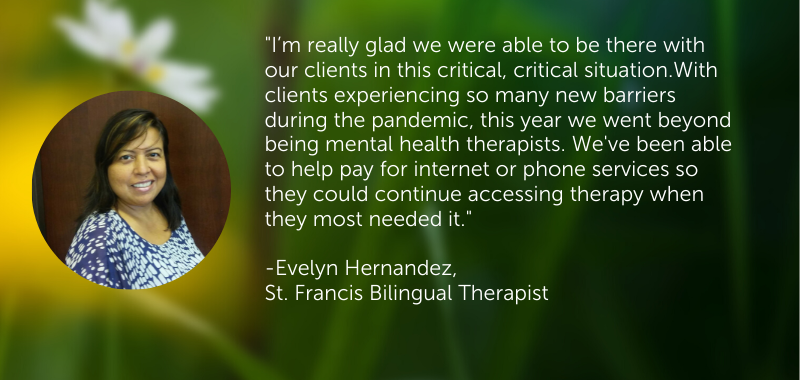May is Mental Health Awareness Month, and so we spoke with Evelyn Hernandez, one of our great Bilingual Therapists, to see the importance of the department, how she became interested in mental health for immigrant Spanish-speakers, and the particular challenges faced by our clients in accessing services.
How did you become a therapist, specifically focusing on working with immigrants and Spanish-speakers?
I was a teacher for a long time, and although teaching was a good profession, I always felt there was something else I should be doing. I realized I enjoyed helping students through the emotional issues they were facing, which gave me a clue that I should become a therapist.
While I could do therapy in English, I felt that Spanish-speaking immigrants had much more need. Since I speak Spanish, I decided it would be more useful to use my skills with this group.
What needs do you see among our Spanish-speaking, immigrant clients?
We know that 1 in 5 people have a mental health diagnosis in the U.S. population overall. Right there is a significant amount of need. Then looking at our Spanish-speaking immigrant population we serve within our department, they face so many additional barriers in receiving mental health services.
Many of our clients are uninsured, so accessing mental health care is very expensive. They may not have legal status or a Social Security number, so they often do not qualify for services or assistance that others might. My first-generation immigrant clients typically do not speak English, so it is crucial to have therapy in Spanish, and there are not many providers for that. The stigma of mental health often also creates a barrier as well.
What are some of the ways you work to break down these barriers within the Bilingual Mental Health Department?
All of our mental health services are fully bilingual, so clients can feel as comfortable as possible sharing their experiences. All our outreach information is in Spanish and English, and sharing that information with other service providers who serve immigrants helps. Our intake line and all our forms are bilingual, so clients feel confident we can serve them when they call and they can read documents in their own language.
What are some of the ways you help accompany your clients in the program?
With the adult individuals we serve, a crucial aspect is accompanying our clients while navigating different systems, such as the school system. At the same time, supporting our clients in the process of raising children in a new country.
While conflict is inevitable in any parent-child relationship, many of our immigrant clients experience a double conflict – not just the generational gap, but also a cultural gap. Immigrant children and parents are often having very distinct experiences, because the children are learning English, watching different shows, asserting their independence in ways that are not common in their parent’s home countries. Realizing all of this – that the children have grown up with different values and beliefs, and not their own home country – can be difficult to process for parents. I see my role as a therapist in helping parents work through this, and at times being a bridge between the two cultures.
How was providing mental health services in a pandemic?
Tele-health was a learning curve for everyone. The Bilingual Mental Health team had to explore video therapy programs, pick one that would be simple for our clients, and then train the clients in how to use it. For some clients it was extremely difficult to access technology, so we did some teaching of specific skills, like how to click a link, adjust the volume of a call, and so on. All of that before we could even get to therapy!
During the pandemic, of course, anxiety and depression have increased among our clients. For some who had issues before, those issues became bigger. In addition, others developed new issues I had never seen before, and having a history of trauma, some clients were paralyzed with fear. Others have been more resilient and were relatively fine.
I am really glad that we have this department and we were able to be there with our clients in this critical, critical situation. Since our clients often had no access to outside assistance, like a stimulus check, this situation has hit them very hard. With clients experiencing so many new barriers, we went beyond being mental health therapists. We’ve done so much more case management than we usually do, providing direct aid to our clients for food, utility bills, rent, and more. In some cases, we also paid for internet or phone services so they could continue accessing therapy when they needed it the most.
Our Bilingual Mental Health Counseling Department serves families and children who migrate to St. Louis and have suffered trauma that impedes their adjustment to the St. Louis community. We are one of the few providers in the St. Louis area who offer Spanish-language therapy to children, adults, and families as they work through these past experiences. Our clinical staff is trained in a wide variety of evidence-based practices to assure they are able to have the most appropriate intervention for each individual.



